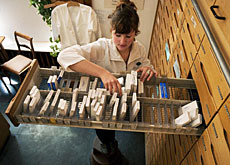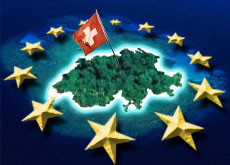Cheaper goods face rocky road

The government wants to open Switzerland's markets to products authorised in the European Union to help cut prices, but major obstacles are hindering progress.
Switzerland’s price regulator, Rudolf Strahm, told swissinfo vested interests and legislation incompatible with EU norms are keeping Swiss prices high.
Swiss consumers pay 20-30 per cent more than their counterparts in neighbouring European countries for the same goods.
One reason for the difference is the current restriction on parallel, or direct, imports from EU member states. Swiss businesses are forced to import products from the EU through Swiss distributors because Switzerland has its own set of norms and patent regulations.
This means that EU goods, if they are to end up on Swiss shelves, have to be labelled in French, German and Italian and conform to a variety of other standards unique to Switzerland.
Bern hopes that by implementing the so-called “Cassis de Dijon” principle taken from EU law – under which a product legally manufactured in one EU state may circulate freely in another – the pressure on Swiss consumers’ pockets will be eased.
Strahm told swissinfo, however, that putting this principle into practice would require changes to the law and differing opinions within the Swiss administration would need to be reconciled.
“The devil lies in the detail … which will come with legislation. One side would prefer a case-by-case approach, which would require reciprocity, for harmonising norms between Switzerland and the EU,” he said.
“They think that 470 million people in 25 countries should equally accept the Swiss norms as Switzerland with seven million people accepts EU norms.”
He added that, from his position as price regulator, all Swiss norms that are different from EU ones should be abolished and the EU norm should be accepted.
Distribution
Beyond Bern the distributors which supply Swiss supermarkets have little interest in easing restrictions for EU products, since they profit from the current arrangements.
And some have the weight of foreign multinationals behind them, according to Strahm.
“It is not only the importers who are interested [in stifling competition] but also the big multinationals [who supply them] because the latter are following the practice of market segmentation, which means in every country they try to fix prices at the highest level possible according to the purchasing power of the population,” he said.
“Higher wages mean higher prices in the domestic sector and higher purchasing power,” Strahm said. “I think that is OK, but for imports we pay 20-30 per cent more for the same products [than neighbouring countries]. That’s why we say that for internationally traded products the price should not be higher here unless they are of a better quality.”
Other restrictions
Strahm emphasised it would take more than the introduction of a European legal principle to make consumer goods cheaper in Switzerland.
Other trade barriers existed which needed to be dealt with, he said. One is national patent legislation, which can also push product prices up and prevent direct imports.
Migros, Switzerland’s leading supermarket chain, was unable to import a luggage range directly from the EU because a small component had been patented separately in Switzerland. This meant the product had to be bought through a local distributor at a price that was up to 35 per cent higher than in neighbouring Germany.
Strahm believes there are other ways to lighten the financial burden on Swiss consumers.
“We could introduce free trade in all domains, maybe with a customs union, which would cover all products and norms. This could be a new form of privileged partnership between EU and Switzerland.”
swissinfo, Faryal Mirza
Rudolf Strahm has been price regulator since August 2004.
Between 1991 and 2004 Strahm was a member of the House of Representatives for the centre-left Social Democratic Party.
He was also president of the Swiss Tenants’ Association.
After being selected for the ombudsman position, he stood down as a parliamentarian.
Restrictions on parallel imports are forcing Swiss consumers and businesses to pay an extra SFr30 billion ($23.4 billion) a year for products.
This means paying 30% more for goods that are available cheaper in neighbouring countries.
Product groups affected include luggage, electrical products, stationery and office materials, toys, sport items, food and toiletries.
For the ten most popular products in Switzerland, the delivery price is on average 48% more than in Germany.

In compliance with the JTI standards
More: SWI swissinfo.ch certified by the Journalism Trust Initiative


You can find an overview of ongoing debates with our journalists here. Please join us!
If you want to start a conversation about a topic raised in this article or want to report factual errors, email us at english@swissinfo.ch.